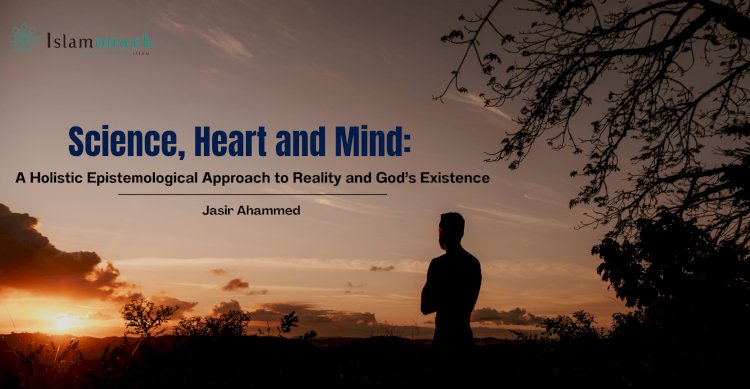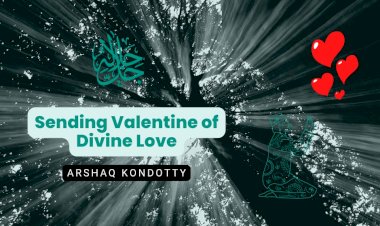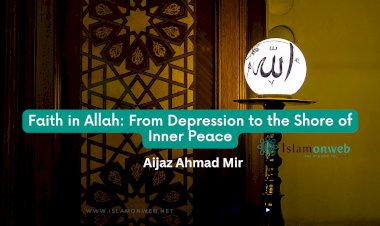Science, Heart and Mind: A Holistic Epistemological Approach to Reality and God’s Existence
“The Qur’anic cosmology offers a composite epistemology that blends empirical, rational, and spiritual ways of knowing—using the body, the mind, and the heart. This triadic model makes possible enhanced understanding of material and metaphysical reality”
The quest for knowledge has shaped human civilisation, from ancient philosophy to modern science. The Scientific Revolution in the 16th and 17th centuries led to scientism, which holds that the scientific method is the only legitimate means of attaining truth.
However, scientism rejects metaphysical, ethical, and theological questions, thereby ignoring fundamental human questions about consciousness, ethics, and the existence of God. This essay critiques the limitations of scientism, suggesting a more comprehensive epistemology based on the Qur'anic perspective, which combines empirical observation, rational analysis, and spiritual intuition to provide a richer understanding of reality.
The Dominance of Scientism and Its Epistemological Limitations
Today’s intellectual landscape is dominated by scientism. It maintains that knowledge can only exist where there is empirical verifiability, reducing metaphysical, ethical, and religious assertions to nothingness or subjectivism.
While science has revolutionised medicine, technology, and industry, success has caused many to regard science as the ultimate authority for truth. Consequently, questions that are beyond the empirical domain—such as life's meaning, ethics, the hereafter, and the existence of God—are considered to be unscientific.
This epistemic reductionism has severe limitations. Science may explain how life functions, but it cannot answer why life exists; the question of purpose lies beyond its scope. Similarly, moral truths cannot be derived from empirical observation; science cannot dictate what is right or wrong. Matters such as death and the afterlife also elude scientific inquiry, as they pertain to non-material realities. Most fundamentally, God, the Transcendent, remains beyond the realm of measurement or experimentation—He is not subject to scientific tools or methods.
Science often leads to reductionist or speculative answers to "Big Questions" like "Why are we here?" and "Ethics", without acknowledging human longing for purpose and intentionality. This can lead to existential confusion and nihilism, which can foster spiritual emptiness and psychological distress.
Thus, science is indispensable for understanding the material world, but it has its limitations. A more holistic epistemology, such as that of the Qur’anic perspective, is required, combining empirical, rational, and spiritual capacities to address the entire range of reality.
Qur’anic Epistemology: The Triune Path to Truth
The Qur’anic cosmology presents a comprehensive epistemology that integrates empirical, rational, and spiritual modes of knowing, encompassing the body, the mind, and the heart. This triadic model enables an enhanced understanding of both material and metaphysical reality.
- Empirical Knowledge (Body)
The Qur'an promotes the study of the natural world—its order, beauty, and operation—as indications (āyāt) of God's wisdom. The body acquires knowledge about the creation through the sense faculties to serve as a basis for reflection.
إِنَّ فِى خَلْقِ ٱلسَّمَـٰوَٰتِ وَٱلْأَرْضِ وَٱخْتِلَـٰفِ ٱلَّيْلِ وَٱلنَّهَارِ لَـَٔايَـٰتٍۢ لِّأُو۟لِى ٱلْأَلْبَـٰبِ
“Indeed, in the creation of the heavens and the earth and the alternation of the night and the day are signs for people of understanding.”
(Qur’an 3:190)
This mode confirms empirical investigation, but also cautions against reducing nature to purely mechanistic processes without meaning.
- Rational Knowledge (Mind)
The Qur'an attaches importance to reason and reflection, employing words such as yatafakkarūn (they think), ya‘qilūn (they exercise intellect), and yatadabbarūn.
أَوَلَمْ يَتَفَكَّرُوا۟ فِىٓ أَنفُسِهِم ۗ مَّا خَلَقَ ٱللَّهُ ٱلسَّمَـٰوَٰتِ وَٱلْأَرْضَ وَمَا بَيْنَهُمَآ إِلَّا بِٱلْحَقِّ وَأَجَلٍۢ مُّسَمًّۭى ۗ وَإِنَّ كَثِيرًۭا مِّنَ ٱلنَّاسِ بِلِقَآئِ رَبِّهِمْ لَكَـٰفِرُونَ ٨
“Do they not reflect within themselves? Allah created the heavens and the earth and everything between them for a purpose and for an appointed time.”
(Qur’an 30:8)
The intellect considers, infers, and relates to observed phenomena but is tempered in its functioning by reason. Reason itself is susceptible to arrogance if intellectual functioning lacks spiritual grounding, as seen in Iblīs.
- Spiritual Gnosis (Heart)
The qalb, or heart, is in the Qur'an portrayed as the seat of perception and gnosis. It knows ethical and metaphysical truths which are beyond sensory or rational grasp.
أَفَلَمْ يَسِيرُوا۟ فِى ٱلْأَرْضِ فَتَكُونَ لَهُمْ قُلُوبٌۭ يَعْقِلُونَ بِهَآ أَوْ ءَاذَانٌۭ يَسْمَعُونَ بِهَا ۖ فَإِنَّهَا لَا تَعْمَى ٱلْأَبْصَـٰرُ وَلَـٰكِن تَعْمَى ٱلْقُلُوبُ ٱلَّتِى فِى ٱلصُّدُورِ
“Have they not traveled through the land, and have hearts by which to reason and ears by which to hear? For indeed, it is not the eyes that are blind, but it is the hearts in the breasts that grow blind.”
(Qur’an 22:46)
A purified heart is open to guidance from the Divine and is capable of perceiving ultimate realities, like the meaning of life, the hereafter, and the presence of God.
An Integrative Illustration: The Seed
A seed, initially small, grows into a living plant, indicating a higher intelligence beyond randomness. Reflecting deeply, the seed becomes a spiritual sign, reminding us of a Creator who designs wisdom and renews life. The Qur'an reflects this harmony, revealing that truth is fully visible when the body observes, the mind reflects, and the heart listens. This demonstrates how different ways of knowing, including observation, reason, and spirituality, can come together in a harmonious synthesis.
God’s Reality and the Need for Holistic Inquiry
The Qur’an doesn’t aim to “prove” God in a dry, philosophical way. It speaks to something deeper within us—our fitrah, or innate awareness. It calls to the whole human being: body, mind, and heart. It does this through three interwoven ways of knowing:
1. Empirical Signs – Āyāt Kauniyyah (Cosmic Indicators)
Nature isn’t just a collection of atoms and energy. In the Qur’an, the natural world is filled with signs (āyāt) that point to the Creator’s power, care, and design.
إِنَّ ٱللَّهَ فَالِقُ ٱلْحَبِّ وَٱلنَّوَىٰ ۖ يُخْرِجُ ٱلْحَىَّ مِنَ ٱلْمَيِّتِ وَمُخْرِجُ ٱلْمَيِّتِ مِنَ ٱلْحَىِّ ۚ ذَٰلِكُمُ ٱللَّهُ ۖ فَأَنَّىٰ تُؤْفَكُونَ
"Indeed, Allah is the cleaver of grain and date seeds. He brings the living out of the dead and brings the dead out of the living..."
(Qur’an 6:95)
Processes like germination, the water cycle, or even death and rebirth in ecosystems—they are scientifically measurable, but the Qur’an invites us to see them as messages, not just mechanisms.
2. Rational Reflection – Tafakkur (Contemplation)
The Qur’an speaks directly to our minds, asking questions that demand thought and challenge assumptions.
أَمْ خُلِقُوا۟ مِنْ غَيْرِ شَىْءٍ أَمْ هُمُ ٱلْخَـٰلِقُونَ
"Were they created by nothing, or were they themselves the creators?"
(Qur’an 52:35)
It’s not just rhetoric—it’s a deep logical challenge. How could such a complex, ordered universe come from nothing? This supports the idea of a deliberate Creator, using design and harmony as clues for us to follow.
3. Spiritual Intuition – Ḥads (Inner Witnessing)
Beyond logic and observation lies a quieter voice—the voice of the heart. The Qur’an affirms that we carry within us an intuitive recognition of God.
وَإِذْ أَخَذَ رَبُّكَ مِنۢ بَنِىٓ ءَادَمَ مِن ظُهُورِهِمْ ذُرِّيَّتَهُمْ وَأَشْهَدَهُمْ عَلَىٰٓ أَنفُسِهِمْ أَلَسْتُ بِرَبِّكُمْ ۖ قَالُوا۟ بَلَىٰ ۛ شَهِدْنَآ ۛ أَن تَقُولُوا۟ يَوْمَ ٱلْقِيَـٰمَةِ إِنَّا كُنَّا عَنْ هَـٰذَا غَـٰفِلِينَ
"And [remember] when your Lord took from the children of Adam... their descendants and made them testify of themselves, [saying], ‘Am I not your Lord?’ They said, ‘Yes, we have testified...’"
(Qur’an 7:172)
This verse recalls a primordial moment—a covenant made before birth. According to the Qur’an, every soul carries this echo of Divine awareness. Life often distracts us, but deep down, we already know.
Critiquing the Separation of Knowledge Domains
One of the Qur'an’s most powerful critiques addresses the division of knowledge, a divide that is not only evident in modern secular thought but also in pre-modern systems. Today, we often draw a sharp line: scientific knowledge is viewed as objective, rational, and universal, while religious belief is seen as subjective, emotional, and unverifiable. This division sidelines spiritual knowledge, relegating it to the private or cultural spheres, which limits our understanding of the world and our place within it.
But the Qur'an rejects this split. For the Qur'an, knowledge isn’t fragmented. Science, morality, art, and spirituality are interconnected—they are all different expressions of the same quest to understand the Divine and the universe. The Qur'an teaches that accepting one form of knowledge while dismissing others is epistemological hypocrisy.
ۚ أَفَتُؤْمِنُونَ بِبَعْضِ ٱلْكِتَـٰبِ وَتَكْفُرُونَ بِبَعْضٍۢ
(“Do you believe in part of the Book and disbelieve in another part?” (Qur’an 2:85)
Though this verse originally addressed the People of the Book, it carries a timeless message: partial acceptance of truth undermines its fullness. Today, ideologies that prioritise empirical science while dismissing metaphysical insights fall into this trap. By narrowing our definition of truth to what can be observed, we miss the more profound wisdom that other forms of knowing offer.
In the Qur’anic worldview, the heart (qalb), intellect (‘aql), and senses (ḥawās) must work together in the pursuit of truth. Separating reason from revelation or science from spirituality distorts the role of each faculty. It’s like turning reason into cold logic, stripping science of its wonder, and excluding the heart from the search for knowledge.
Proper knowledge, according to the Qur'an, comes from harmonising these faculties—empirical observation, rational inquiry, and spiritual perception. This integrated approach restores depth, integrity, and purpose to human understanding, reminding us that the universe isn’t just a set of facts to be observed, but something to be experienced and spiritually understood.
Conclusion
In a world where science is often seen as the ultimate authority on truth, we must reclaim a more holistic approach to knowledge—one that values both reason and spirituality. Science excels at explaining the mechanics of the physical world, but it falls short when addressing deeper questions of meaning, purpose, and the existence of God.
The Qur’anic model of knowledge embraces empirical inquiry while situating it within a broader framework that includes spiritual and moral dimensions. It teaches that accurate understanding requires not only the senses and intellect, but also the heart (qalb) to perceive deeper meanings and transcendence.
This perspective challenges scientism—the belief that science is the only valid form of knowledge—and reminds us that some truths, such as the nature of the soul, the afterlife, and divine purpose, lie beyond the reach of scientific methods. By revisiting this balanced vision of knowledge, we can bridge the gap between faith and reason, providing a richer and more fulfilling path to understanding. Science and spirituality should not compete but enrich one another.
About the author:
Jasir Ahammed is a degree scholar at Darul Huda Islamic University, specialising in the Department of ʿAqīdah and Philosophy.
References:
- The Holy Qur’an.
- Nasr, H. n.d. “The Case for Allah’s Existence.” Yaqeen Institute for Islamic Research. Accessed May 17, 2025. https://yaqeeninstitute.org/curriculum/principles-of-faith/the-case-for-allahs-existenc.
- Mohammed Hijab. 2020. “The Metaphysical Argument for God's Existence.” YouTube video, 1:14:22. July 15, 2020. https://www.youtube.com/watch?v=ECibetK2EYI.
- MercifulServant. 2022. “Does Science Prove God?” YouTube video, 10:01. November 5, 2022. https://www.youtube.com/watch?v=w70BkCqgyyI.
- Al-Attas, Syed Muhammad Naquib. 1995. Prolegomena to the Metaphysics of Islam: An Exposition of the Fundamental Elements of the Worldview of Islam. Kuala Lumpur: ISTAC.
- Craig, William Lane. 2008. Reasonable Faith: Christian Truth and Apologetics. 3rd ed. Wheaton, IL: Crossway.
- Nasr, Seyyed Hossein. 2006. Science and Civilisation in Islam. Cambridge, UK: The Islamic Texts Society.
- Nagel, Thomas. 2012. Mind and Cosmos: Why the Materialist Neo-Darwinian Conception of Nature is Almost Certainly False. Oxford: Oxford University Press.
Disclaimer
The views expressed in this article are the author’s own and do not necessarily mirror Islamonweb’s editorial stance.
























Leave A Comment